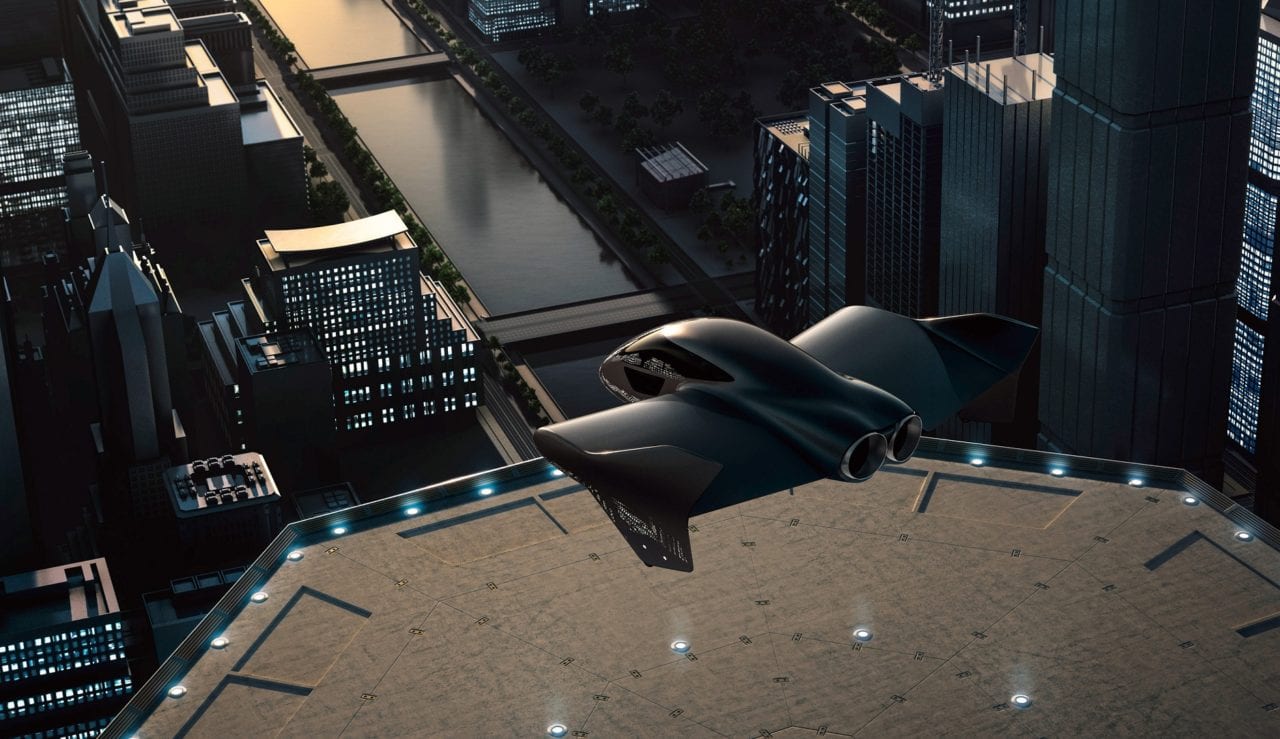
Porsche and Boeing have signed an MoU to develop a prototype electric vertical takeoff and landing vehicle. (Porsche)
The latest auto company to invest in the urban air mobility space is Porsche, signing a Memorandum of Understanding with Boeing to explore the premium urban air mobility market, according to the two companies.
Porsche is betting that initial access to urban air vehicles will be limited to the wealthy, who will be more interested in a comfortable, personal flight experience than the ride-sharing concept championed by Uber and others.
“Like most new markets, we believe urban air mobility will start as a premium market, as it will be restricted to the people who are willing to pay the amount of money necessary to travel like that,” Uwe Gross, Porsche’s senior manager for urban air mobility, told Avionics International. “Most markets open up from the top, and we want to be in the market early.”
A team of engineers from Porsche and Boeing subsidiary Aurora Flight Sciences will develop and test a full-scale electric vertical takeoff and landing (eVTOL) vehicle, with hopes to fly the prototype next year. Most of the design details have not yet been decided; questions about propulsion systems were met with an encouragement to “keep guessing.”
“It will be all-electric and a two-seater. I can tell you that,” said Guan Chew, Porsche’s air vehicle program director. “Everything else, we are still in the definition and exploration phase.”
Porsche’s vehicle will be designed with the same UAM mission concept as many other entrants, seeking to move passengers around short distances within cities and their immediate surroundings. But Porsche isn’t looking to simply design a vehicle with the technical capability to achieve that mission.
“We often say that Porsche was founded 70 years ago because we looked around and couldn’t find the sports car we wanted to own, so we built one,” Gross said. “Similarly, looking at the air vehicle designs out there, we couldn’t see the vehicle we wanted; they’re all technical and functional but have no emotion in the design.”
Boeing clarified to Avionics that its eVTOL design effort with Porsche is “complementary with Aurora’s ongoing flight testing of the Passenger Air Vehicle proof of concept.”
The Boeing/Aurora-Porsche team of 20 business development professionals, engineers and designers hopes to develop a personal air vehicle that will not just provide safe transportation, but comfort, personality and the customer experience that is “part of the Porsche DNA,” the company told Avionics.
But as the non-premium flying car market works to win the public acceptance that will prove critical to infrastructure access in urban areas, critics may see Porsche’s goal of catering to the wealthy as detrimental to the cause. Uber, Blade and Voom, three providers of present-day urban transport via helicopter, all purposely focus their communications and branding on bringing aerial mobility to everyone.
“Uber and many others are planning more for mass transportation, moving four to five people in a ride-sharing situation,” Gross said. “Our concept is more personal transportation … you can hail not a seat, but a whole vehicle for yourself.”

The Boeing-Porsche team hasn’t yet made design decisions beyond all-electric and two passengers. (Porsche)
Porsche does believe its personal air vehicles will fit into the same ecosystem as shared air taxis, and the company is exploring a variety of business models.
“We’re not just looking at the service market, but maybe also private leasing markets. It might be possible for our customers to lease a vehicle that we might operate for them, so it’s not a public shared vehicle but more a personal vehicle,” Gross said. “We think that private ownership doesn’t mean that you fly wherever you want and whenever you want … if the traffic in the air is regulated, it will probably also be possible for private vehicles to enter the airspace.”
 | Want more eVTOL and air taxi news? Sign up for our brand new e-letter, “The Skyport,” where every other week you’ll find the most important analysis and insider scoops from the urban air mobility world. |
In the next three to six months, the Porsche team hopes to make significant progress on its vehicle design, validate their product and ecosystem assumptions and potentially find new partners. The company plans to have a full-scale prototype flying by next year, though it hasn’t yet decided on which side of the pond its testing and development will take place.
“We’re unsure at this point, it’s still early days and we’re open to different locations,” Chew told Avionics.
The decision will have little to do with whether the timeline for certification appears quicker through FAA or EASA, Chew added, but rather where Porsche believes the initial wave of customers for its premium product is likely to be.